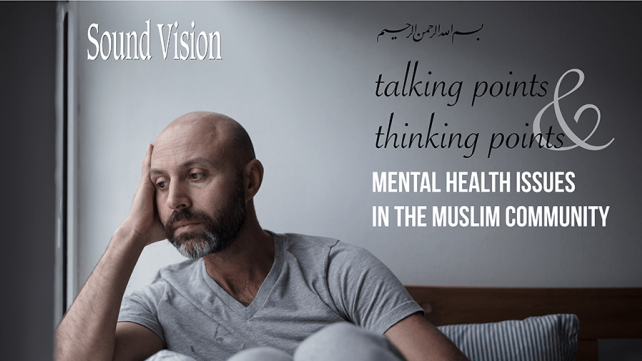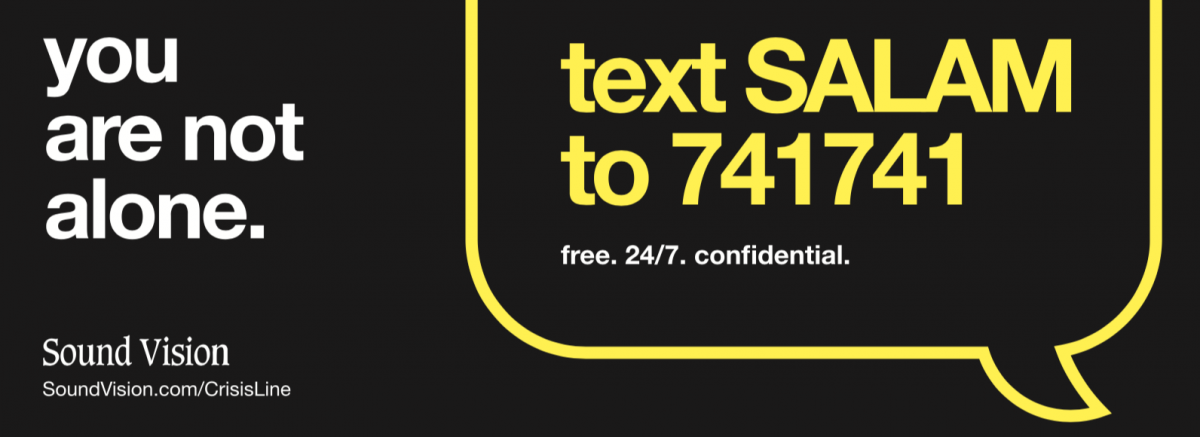
In the last 17 days, five Muslims were involved in killing 19 people or killing themselves in America. All of them were young. Some of them were bullied in school. Each one of them, according to media reports, had mental health issues.
To God we belong and to Him we return.
Mental health must become a prime concern for the Muslim community. We need more education and more resources.

We saved three lives
At Sound Vision, we have partnered with the Crisis Text Line to offer a 24/7 confidential, anonymous texting service. Alhamdu lillah, we have thus far been able to save the lives of three lives of young Muslims who were planning to die by suicide in different parts of the United States.
Over 40 percent of young Muslims who were calling or texting us pre-pandemic were doing so because of anxiety or depression. 13% were talking about committing suicide.
Please note that young people text instead of calling. Please publicize, volunteer and donate for this service.
Learn More about
Text SALAM to 741741
Mental health is a major problem in our society. One in five American adults have experienced a mental health issue. A higher percentage of Muslims face mental health issues, and it is very likely that the Islamophobia-war-terrorism cycle in some ways contribute to this.
Thinking Points:
- When was the last time you heard a Khutba about the mental health? Here are some tips for Khutba on this topic
- What resources did your Islamic center offer for mental health?
- Do you know how to assist a person with mental health issues?
- The vast majority of people with mental health problems are no more likely to be violent than anyone else. Only three to five percent of violent acts can be attributed to individuals living with a serious mental illness
- Muslims are more peaceful than their neighbors of other faiths
- In the U.S., on average,112 people die by suicide every day and 44 people are murdered daily.
- Mental health issues in the Muslim community are gradually getting some recognition. There is an annual Muslim mental health conference and there is a Journal of Muslim Mental Health. Here is a Muslim mental health toolkit developed by the Institute for Social Policy and Understanding.
- The pandemic and its resulting isolation is worsening the mental health situation in America and around the world. A November 2020 Gallup poll found that their mental health is worse than it has been at any point in the last two decades.
- A survey by the American Psychological Association (APA) conducted during the first wave last year found that people of color (who make up the majority of the Muslims in the U.S.), are more likely than white adults to report significant stressors in their life as a result of the pandemic
- This effect on mental health is leading to violence inside the home and outside of it
- Dealing with stress- induced mental health struggles requires both spiritual and professional resources.
Mental Health Challenges May Continue
We are afraid that the mental health issue might continue at a higher levels in the Muslim community in general, and especially among young Muslims because of the following factors:
- 55% of Muslim kids are bullied at school
- Only 10% of young Muslims are connected with Islamic education
- 50% of college-going Muslim drink alcohol
This points to a greater need for more resources and a far higher level of education about mental health struggles in the Muslim community.
Talking Points:
More Khutbas and more family conversations are in order.
- Myth: The absence of faith, personality weakness or character flaws cause mental health problems.
- Fact: Mental health problems have nothing to do with weak Iman, personality flaws, etc.
Many factors contribute to mental health problems, including:
-Biological factors, such as genes, physical illness, injury, or brain chemistry
-Life experiences, such as trauma or a history of abuse
-Family history of mental health problems
People with mental health problems can get better and many recover completely. Seeking professional help makes a big difference, so it’s important to seek it and help others get it when they need it. Here is a list of Muslim mental health providers.
- Myth: There is no hope. Once a friend or family member develops mental health problems, they will never recover.
- Fact: Studies show that people with mental health struggles get better and many recover completely. Recovery refers to the process in which people are able to live, work, learn, and participate fully in their communities. There are more treatments, services, and community support systems than ever before, and they work.
- Myth: Therapy and self-help are a waste of time. Why bother when you can just take a pill?
- Fact: Treatment for mental health problems varies depending on the individual and could include medication, therapy, or both. Many individuals work with a support system during the healing and recovery process
- Myth: Prevention doesn't work. It is impossible to prevent mental illnesses.
- Fact: Prevention of mental, emotional, and behavioral disorders focuses on addressing known risk factors such as exposure to trauma that can affect the chances that children, youth, and young adults will develop mental health problems. Promoting the social-emotional well-being of children and youth leads to:
- Higher overall productivity
- Better educational outcomes
- Lower crime rates
- Stronger economies
- Lower health care costs
- Improved quality of life
- Increased lifespan
- Improved family life
Myth: Faith and Iman cannot help deal with mental health.
- Fact: There is a growing body of scientific literature pointing toward the role faith plays in one’s healing process. Seeking professional help is like tying the camel and then doing Dua and the Tawakkul on Allah for help. Here is an article by Zeba Khan, a former intern of Sound Vision which will help you feel and connect. And here are 25 ways of dealing with stress and anxiety as a Muslim.
Action Items
- We request that you give priority this Ramadan to supporting mental health in the Muslim community. Please ask each Muslim organization who requests you for funds, what are they doing to educate and provide resources in the area of mental health. Please donate to our Crisis Text Line.
- While you think about persuading your organization to do more. I request that you promote this Crisis Text Line. It is free. SoundVision.com/crisisline
- Pay special attention to young Muslims this Ramadan and beyond. Many are struggling for various reasons, and it’s important to know the signs to watch out for if they are considering a step as drastic as self-harm or suicide. Be a sympathetic ear and get them the help they need, spiritual, professional, and other.
- Make Dua for all who are suffering from mental illness and mental health struggles.



Add new comment